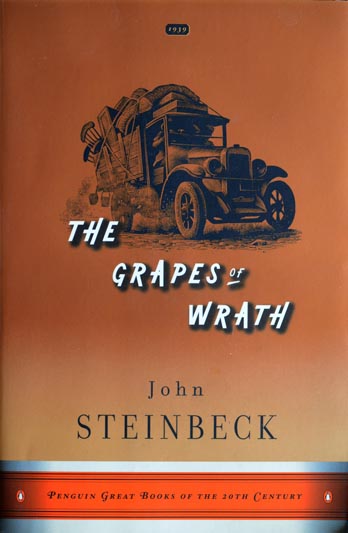The Grapes of Wrath
“Man, unlike any other thing organic or inorganic in the universe, grows beyond his work, walks up the stairs of his concepts, and emerges ahead of his accomplishments.”
 First published in 1939, The Grapes of Wrath still offers a savage read. In its depiction of the despair and cruelty brought on by misfortune this book has lost none of its power. In fact, the tragedy that befell the Joad family is eerily similar to the sufferings sustained in contemporary times by many of those insisting – or resigned – to derive a living from an honest day’s work without the benefit of an honest day’s pay. In the US, flipping burgers, stuffing shelves, waiting on tables, picking fruit and countless other jobs no longer pay a living wage.
First published in 1939, The Grapes of Wrath still offers a savage read. In its depiction of the despair and cruelty brought on by misfortune this book has lost none of its power. In fact, the tragedy that befell the Joad family is eerily similar to the sufferings sustained in contemporary times by many of those insisting – or resigned – to derive a living from an honest day’s work without the benefit of an honest day’s pay. In the US, flipping burgers, stuffing shelves, waiting on tables, picking fruit and countless other jobs no longer pay a living wage.
One of only a few books to gain near-universal acclaim as a Great American Novel, The Grapes of Wrath angrily exposes the corporate moguls who caused the depression of the early and mid-1930s and exacerbated its social effects by conspiring against reform and relief. After finishing the novel, John Steinbeck explained that he wanted to “put a tag of shame on the greedy bastards responsible for this [the Great Depression].”
Arriving in the wake of literary gems such as In Dubious Battle and Of Mice and Men, The Grapes of Wrath firmly established Mr Steinbeck’s reputation as the writer of choice on the many inequities rampant in the Land of the Free. He also became the conscience of a troubled generation. Fêted as a socialist by the struggling American left, Mr Steinbeck was, however, first and foremost an individualist. In fact, he despised socialism as “just another religion and thus delusional.” According to Steinbeck biographer Jay Parini, East of Eden (1952) reads like a “hymn to individualism.”
The Grapes of Wrath earned its writer the 1962 Nobel Prize of Literature and the 1940 Pulitzer Prize. Upon its release, the novel caused an outrage in the US and triggered a lively national debate. Copies were burned and banned from school libraries. The Associated Farmers of California was incensed at Steinbeck’s depiction of the sorry plight of farmhands and labelled the book “communist propaganda.” However, the book was mostly read: it sold well over 430,000 copies in its first year and since then has never been out of print.
The Grapes of Wrath remains required reading for high school students in most Anglophone countries. However, for all its raw power the book failed to change the world. The optimism with which Clifton Fadiman welcomed the novel in The New Yorker proved unfounded: “If only a couple of million over-comfortable people can be brought to read it, John Steinbeck’s The Grapes of Wrath may actually effect something like a revolution in their minds and hearts.”
| Title | The Grapes of Wrath |
| Author | John Steinbeck |
| ISBN | 978-0-1430-3943-3 |
| link | http://www.amazon.com/gp/search?index=books&field-isbn=9780143039433 |
You may have an interest in also reading…
The Gonzo Papers Anthology
“Absolute truth is a very rare and dangerous commodity in the context of professional journalism.” For a meticulous dissection of
Lutz Schwenke: Life — and Business — on an Ocean Wave
Devon has some of the best surfing beaches in the UK — a fact which may have played a part
Eichmann in Jerusalem: A Report on the Banality of Evil
“The sad truth is that most evil is done by people who never make up their minds to be good

















































































